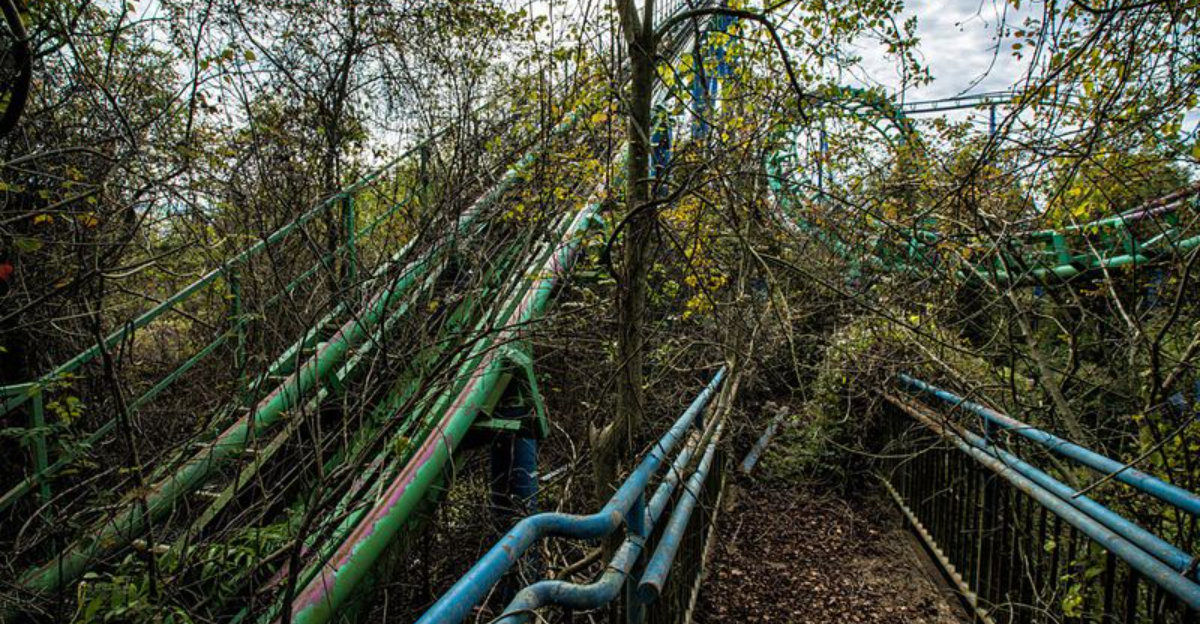
Heritage Square was once a charming Victorian-themed amusement park nestled in the foothills of Colorado, drawing families with its alpine slide, old-fashioned shops, and dinner theater. For decades, it was a beloved destination where visitors could step back in time and enjoy simple, nostalgic fun.
But by 2018, the park had completely closed its gates, leaving behind empty buildings and faded memories. What went wrong with this popular attraction, and why did it disappear so suddenly?
1. Mining Company Took Over
Martin Marietta Materials, a massive construction company specializing in stone and gravel, bought the land where Heritage Square sat. Their business wasn’t running theme parks, it was extracting valuable rocks from the ground.
The company owned the quarry right next door and saw Heritage Square’s property as prime real estate for future mining expansion. Running an amusement park simply wasn’t part of their business plan or vision for the land’s future use.
2. Land Worth More for Mining
Real estate value tells the whole story here. The land beneath Heritage Square contained valuable minerals and aggregates worth far more than ticket sales and souvenir shops could ever generate.
Mining companies can extract millions of dollars worth of materials from a single property over many years. For the new owners, keeping a quaint Victorian village on such valuable land made zero financial sense compared to its mining potential.
3. Leases Weren’t Renewed
Around 2015, something changed dramatically. Shop owners in the Victorian Village section started receiving bad news: their leases wouldn’t be renewed when they expired.
These weren’t corporate chains but independent small business owners who’d invested years into their shops. Without lease renewals, they had no choice but to pack up and leave, even if their businesses were still profitable and popular with visitors.
4. Fewer Visitors Each Year
Long before ownership changed hands, Heritage Square faced a tough reality: people weren’t coming like they used to. Newer, flashier attractions in the Denver area offered more thrills and modern entertainment options.
Families who once made Heritage Square an annual tradition found themselves drawn to bigger regional theme parks with faster rides and updated facilities. The charming, old-fashioned atmosphere that once attracted crowds had become less appealing to younger generations seeking excitement.
5. Major Attractions Closed
Imagine visiting your favorite park only to find the best rides gone. The Heritage Square Opera House, a beloved dinner theater, shut down in 2013, taking away a major entertainment draw.
Then in 2015, the iconic Alpine Slide, arguably the park’s most famous attraction, closed for good. Without these signature experiences, Heritage Square lost much of what made it special and worth the drive for families across Colorado.
6. Park Fell Into Disrepair
After the mining company took control, something suspicious happened. Tenants reported that common areas, utilities, and public restrooms stopped being properly maintained or repaired when problems arose.
Some business owners believed this neglect was intentional, a way to make operating there so difficult that tenants would leave voluntarily. Broken bathrooms and shabby common spaces drove away customers, making it nearly impossible for remaining businesses to succeed.
7. Lost the Heritage Square Name
Brand recognition matters enormously in the tourism industry. When the landowner stopped maintaining the Heritage Square trademark and then restricted its use, the amusement park operator faced a serious problem.
Forced to rebrand as Heritage Amusement Park, the business lost decades of name recognition and marketing value. Longtime fans couldn’t find information online, and new visitors had no idea this was the same beloved destination their parents remembered visiting.
8. Old Buildings Cost Too Much
Maintaining authentic Victorian buildings isn’t cheap. Unlike modern steel and concrete structures, these charming wooden buildings required constant attention, specialized repairs, and expensive historical preservation work.
The aging rides also demanded significant investment to keep them safe and operational. As the park’s revenue declined, finding money for these essential but costly maintenance projects became increasingly difficult, creating a dangerous cycle of deterioration.
9. Legal Battle Ended It
Sometimes disputes end in handshakes, but this one ended Heritage Square. The amusement park operator and the landowner became locked in a lengthy, expensive legal battle over their disagreements.
Eventually, they reached a settlement, but the terms spelled doom for the park. By 2018, the last remaining section of Heritage Square closed permanently, and its rides were auctioned off to the highest bidders, scattered to parks across the country.
10. Land Rezoned for Development
After the rides were removed and the buildings demolished, the landowner’s true intentions became crystal clear. The property was being prepared for commercial and light industrial development, with some areas designated as open space.
This wasn’t about saving a struggling park, it was about maximizing land value all along. The rezoning confirmed that Heritage Square’s days were numbered from the moment the mining company purchased the property years earlier.
Dear Reader: This page may contain affiliate links which may earn a commission if you click through and make a purchase. Our independent journalism is not influenced by any advertiser or commercial initiative unless it is clearly marked as sponsored content. As travel products change, please be sure to reconfirm all details and stay up to date with current events to ensure a safe and successful trip.